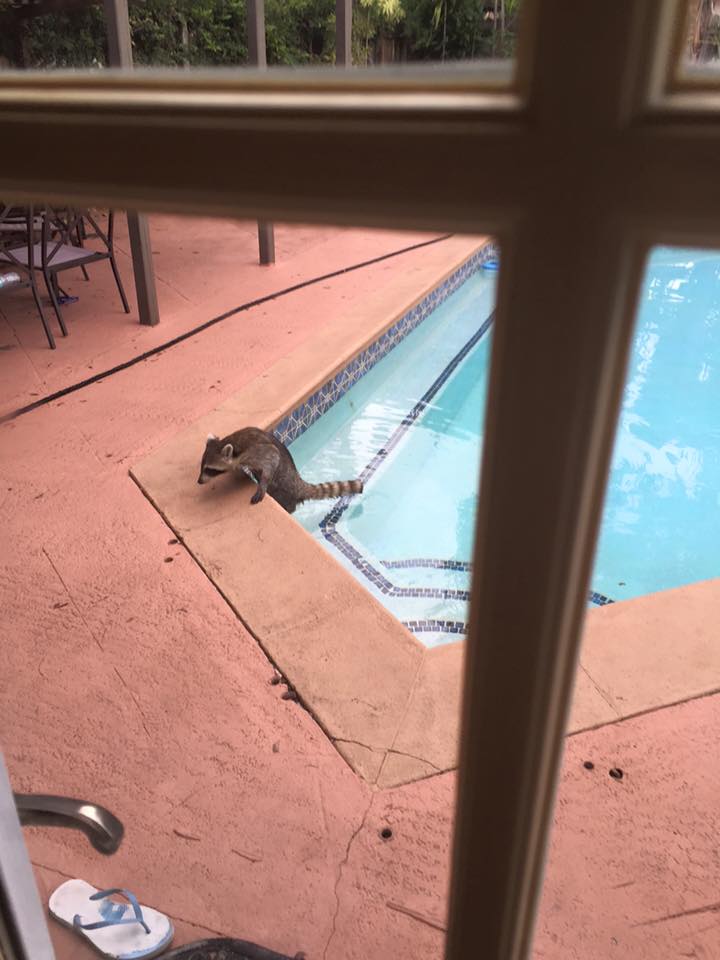Raccoons are intelligent and agile mammals with dexterous hands that allow them to manipulate much in their environment. Their ability to recall and solve problems ranks them in intelligence with Rhesus monkeys. And one of the things they’ve learned is that living amongst people has its advantages in terms of access to food, water, and shelter.
A raccoon’s natural habitat consists of wooded areas near streams and ponds. As their natural habitats have been shrinking, they’ve become adept at living in more suburban and urban areas. To a raccoon, your home’s pool looks just as inviting as a stream or pond. However, raccoons will often poop in and around your pool, creating a health hazard for those the pool was meant for.
Why Raccoons Love Pools

While it’s common lore that raccoons like to wash their food in water before they eat it, scientists have now discovered that they use water for a different purpose. Water makes the pads of a raccoon’s paws more sensitive to what they are holding. The process is called “dousing.” When a raccoon is dousing, it helps them gather information about the food’s texture and ingredients; it helps them distinguish between a tasty morsel and something best set aside.
Raccoon forepaws are covered in tiny spikes that act as sensors. Because more than 60% of a raccoon’s cerebral cortex is dedicated to sensory perception, their hands are incredibly informative tools. Since raccoons are nocturnal, this is especially useful to them as it allows them to “see” their food through this heightened sense of touch.
Raccoon Poop in Pools
If a raccoon has decided that your pool is a safe place for them, they will return regularly. In addition to using the pool to douse, they will poop there too. Raccoons pooping in a pool is not unusual, and you will most likely find their poop in the shallow end, on the steps.
Raccoon poop looks similar to dog poop. It is dark, has broken ends, and will most likely contain seeds and berries, as this is much of what raccoons eat.
Health Risks of Raccoon Poop in Pools
If you find raccoon poop in or around your pool, the pool must be cleaned immediately and thoroughly. Their feces often contain the eggs of a worm called Baylisascaris procyonis, which can infect humans, particularly children, causing severe neurological illness. These eggs can be swallowed while swimming in an infected pool. Unfortunately, while the chlorine in your pool will kill much of what can harm you, it does not kill these eggs.
How to Clean Your Pool of Raccoon Poop
If your pool was contaminated by raccoon poop, you could follow these steps to clean it and make it safe for swimming again:
- Backwash the pool filter.
- Drain and hose the pool thoroughly.
- Use disposable gloves and change all filters, double bagging them in garbage bags. Throw your gloves away in the bag before sealing the garbage bag and disposing of it in the trash.
- Wash your hands thoroughly with soap and hot water.
- Refill your pool.
In addition to this, it’s advisable to make your home property as unattractive to raccoons as possible by
- Keeping your pool covered and its fence closed securely.
- Removing trash cans where they can be easily accessed and keeping their lids tightly closed.
- Bringing pet food and water inside.
- Cleaning up around bird feeders as raccoons also love the seeds and nuts.
Should you suspect you have a raccoon living on your property or in your attic or chimney, Critter Control has the expertise and experience to eradicate raccoons humanely from your property.
References:
